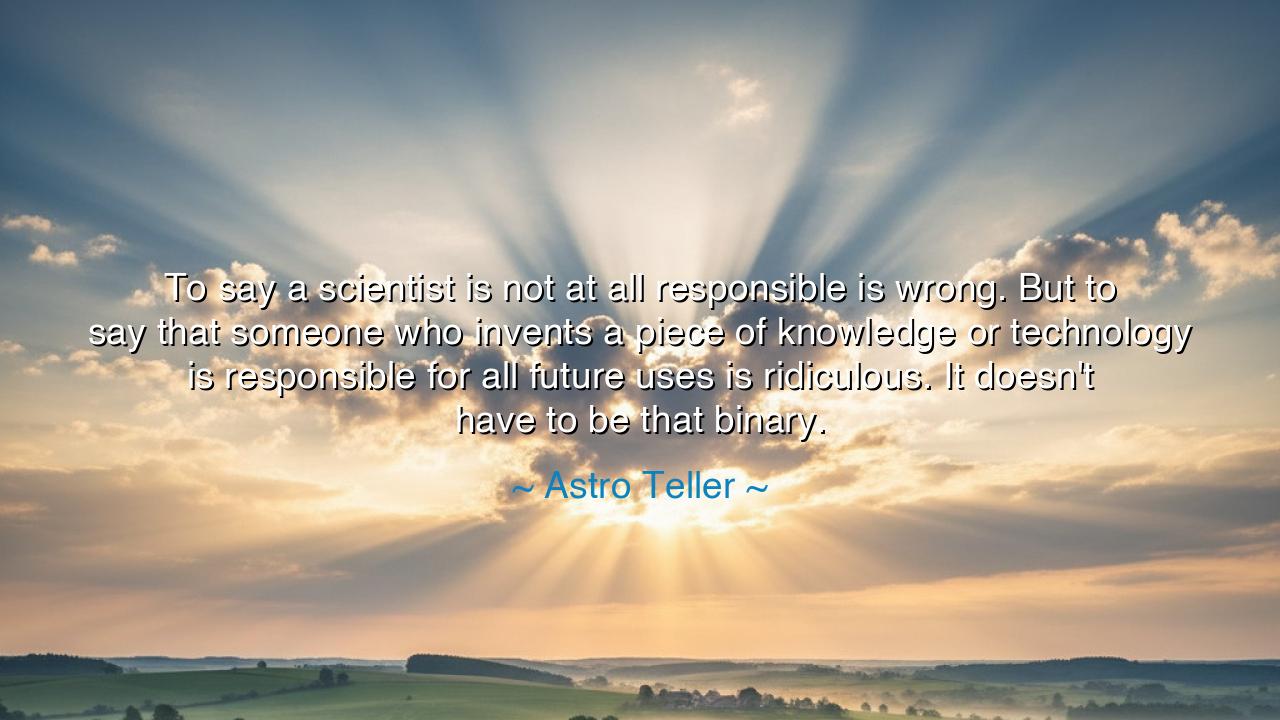
To say a scientist is not at all responsible is wrong. But to say
To say a scientist is not at all responsible is wrong. But to say that someone who invents a piece of knowledge or technology is responsible for all future uses is ridiculous. It doesn't have to be that binary.






The words of Astro Teller — “To say a scientist is not at all responsible is wrong. But to say that someone who invents a piece of knowledge or technology is responsible for all future uses is ridiculous. It doesn’t have to be that binary” — speak to the timeless tension between creation and consequence, between the hands that build and the world that receives. His reflection arises from the modern age, where invention moves faster than morality, and knowledge spreads farther than those who birthed it can foresee. Teller, a scientist and futurist, reminds us that responsibility and innovation are intertwined, yet not chained in absolute guilt or purity. The creator bears weight — but not the weight of every shadow cast by what he makes.
In the ancient world, the same question echoed in different tongues. When Prometheus stole fire from the gods and gave it to mankind, he bestowed both light and destruction. That flame cooked their food, forged their weapons, and illuminated their nights — yet it also burned their cities and brought ruin in war. Was Prometheus guilty for every misuse of fire? The ancients did not think so. They saw him as both hero and tragic sufferer, punished not for malice, but for courage. Teller’s wisdom flows from this same river of thought: that every discovery carries both blessing and peril, and that moral clarity lies not in denial or condemnation, but in discernment.
To say that the scientist has no responsibility, Teller argues, is blindness — for knowledge is power, and power must be guided by conscience. Yet to say that the creator bears infinite responsibility for the sins of those who follow is a cruelty of its own, for it denies the free will of humankind. The truth lies, as he says, not in the extremes but in the middle path — the path of awareness, humility, and wisdom. The scientist must foresee where possible, must caution where needed, and must teach society to use the tools he crafts. But once knowledge is born, it joins the common inheritance of humanity, shaped thereafter by the choices of all.
Consider the story of Alfred Nobel, the inventor of dynamite. He sought to aid construction and mining — to make labor safer and faster — yet his creation was soon turned to war. When he read his own mistaken obituary, which called him “the merchant of death,” he was horrified. In that moment, Nobel realized that his invention had escaped his intent. But instead of despairing, he sought redemption through responsibility — founding the Nobel Prizes, to honor those who advanced peace, science, and human betterment. His life became the embodiment of Teller’s truth: he was responsible for what he had unleashed, but not for how the world chose to wield it. His answer was not denial, but transformation.
In Teller’s reflection lies a deeper philosophy of balance. Every generation inherits the tools of those before it — language, fire, steel, electricity, the atom, and the algorithm — and must decide anew how to wield them. The creators must act with foresight, but the users must act with ethics. To blame one without the other is to misunderstand the nature of human progress, which is not the work of one man, but the unfolding of all humanity together. Knowledge is seed; morality is soil. What grows depends on both.
This truth extends beyond laboratories and inventions. It belongs to teachers, leaders, parents, and artists — to all who give something to the world. The responsibility of the giver is to act with intention, to consider the impact, to guard against corruption. But once the gift leaves their hands, it becomes part of a greater story. To bear that burden fully would be to deny the freedom of others to choose. Teller’s wisdom teaches us to embrace shared responsibility, where creators guide with conscience and society acts with awareness.
The lesson is eternal: the power to create demands vigilance, but also faith. One must walk between the extremes of detachment and guilt. The wise creator does not flee from his responsibility, nor does he drown in it. Instead, he remains a guardian of intention — nurturing innovation with humility, and entrusting its future to those who follow. The world needs both the courage of the innovator and the conscience of the custodian, for together they sustain the flame of progress without letting it consume the world.
Therefore, let all who create remember this: your hands may shape the future, but your heart must guide it. Act with foresight, but do not bind yourself with fear. Teach, caution, inspire — and then release. For creation is an act of both trust and truth, and to live as a maker in any age is to walk the delicate path between destiny and duty — knowing, as Astro Teller reminds us, that it never has to be that binary, but always, profoundly, human.






AAdministratorAdministrator
Welcome, honored guests. Please leave a comment, we will respond soon